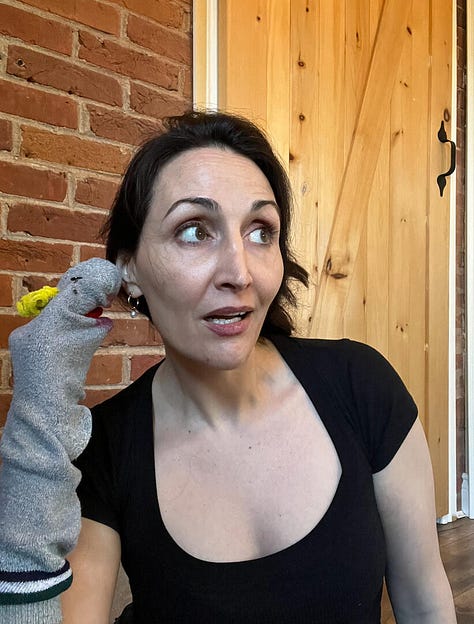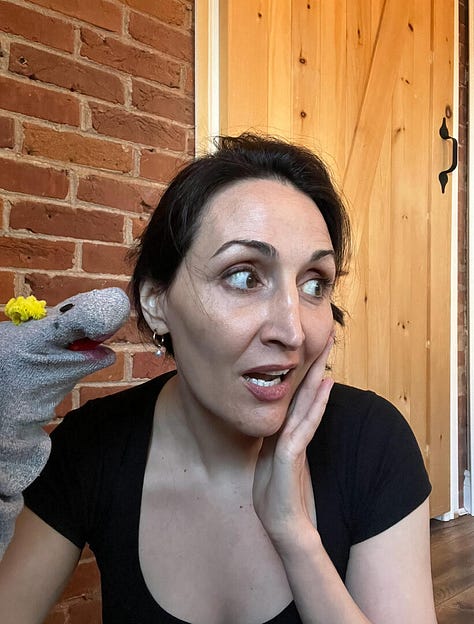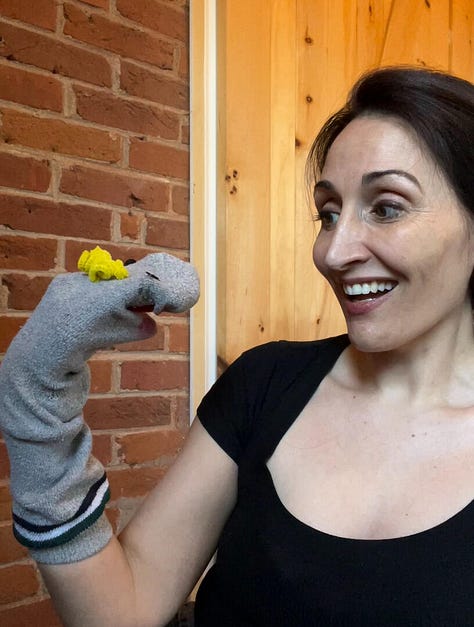Many individuals like myself—and women in particular—who are neurodivergent, historically and even now, are seen as unreliable narrators of our own lives.
Words Count | Hollay Ghadery on Writing While Neurodiverging



Only the Sock Speaks: On Writing While Neurodiverging
When my first book came out in 2021—Fuse, a memoir of mixed race identity and mental illness that dove into my long history of eating disorders, addiction, OCD, self-harm, and anxiety—many readers commented on its unusual structure. Unlike many memoirs, it’s not chronological. It's structured thematically. A veritable Jackson Pollock of feeling. Any loose chronological organization owes thanks to my editor, who convinced me that as a memoir, I needed to root the reader in some vague notion of time.
Which was fair enough.
But this grounding impulse didn't come naturally to me. I don’t set out to be purposely abstruse, it's just the narrative drive of the stories I tell originate in the how and why more often than the when and where.
I'm not sure I’m explaining this clearly. I feel myself—the self I speak with in my head—slide out of frame like one of Dali's deflated clocks. Let’s try again.
Once upon a time, I tried to write a novel.
I did write a novel.
The novel I wrote was not the novel I set out to create.
But I need to go further back than this.
After my collection of short fiction, Widow Fantasies, was accepted for publication, my editor said he'd like to see what I could do with a longer form. Understand: if I'd written traditionally-sized short stories instead of stories that ran the gamut between flash and the unseeming length of about three pages and that (unintentionally, in retrospect) challenge many narrative traditions, maybe I wouldn't have internalized my editor’s statement the way I did. At the time, though, when he said he’d like to see what I could do with a longer form, what I heard was: this is cute, but can you do anything normally?
Which is of course not at all what he actually said. Or meant, I'm sure.
My squirrely interpretation has more to do with the fact that I am aware of the fact that I don't seem able to do things normally. And don’t say “what’s normal” because we all know. There’s a narrative standard. A convention. A tradition. And I know it because I have tried to harness it many times and it eludes me.
When I write, I am aiming to create something fresh, yes, exciting, yes, but I am never trying to confound.
I have these ideas that float about me, and they appear within a range of normal, but when I feed them through my fax-machine brain, what comes out the other side is seldom recognizable as what went in.
About that novel I mentioned.
I meant to write some sort of family saga that examined how women uphold the patriarchy told through the perspective of at least three women.
I ended up with one perspective. And it is the perspective of a sock puppet. The person the sock puppet is attached to says nothing directly the whole book. Not a word. The sock speaks or remembers for this person. Though, of course, the sock is the person, so the human is speaking the entire time.
I toyed with the idea of adding an omnipresent narrator to the mix. A couple of beta readers suggested one might be good to afford the story another perspective, but I recoiled at the very thought. Examining my reaction, I realized that I felt as though people didn't trust the puppet. As though they thought the puppet was not a reliable narrator of its own experience. I felt strongly that no one should be allowed to delegitimize the puppet's experiences.
During the early drafts of the novel, I'd made a prototype of the puppet and had grown rather attached to its fuzzy and fraying rain-cloud coloured self. Where the puppet ended and I began to blur about the edges. So, when people said the puppet wasn't a reliable narrator, I felt like I was being accused of being unreliable. To my mind, the puppet was the only reliable even-headed character in the whole story.
I began to think about how so many individuals like myself—and women in particular—who are neurodivergent, historically and even now, are seen as unreliable narrators of our own lives. We aren't trusted to tell our stories: to reliably assess our own lives. We are patted on the head. Appeased. Drugged. Institutionalized. But not believed. At least not fully.
I’m happy to say the sock remains the sole narrator of the novel. I am and will continue to be open to edits that will add clarity and enhance the writing, but I have arrived at a place in my creative life where I refuse to use neurotypical scaffolding (e.g. a longer story or an omnipresent narrator) to make my neurodivergent mind more palatable.
I mean, let's be honest: I wouldn't know how to if I tried.
What are your thoughts on writing while neurodiverging?
Hollay Ghadery is a multi-genre writer living in Ontario on Anishinaabe land. Fuse, her memoir of mixed-race identity and mental health, was released by Guernica Editions in 2021 and won the 2023 Canadian Bookclub Award for Nonfiction/Memoir. Her collection of poetry, Rebellion Box was released by Radiant Press in 2023, and her collection of short fiction, Widow Fantasies, is scheduled for release with Gordon Hill Press in fall 2024. Her debut novel, The Unraveling of Ou, is due out with Palimpsest Press in 2026, and her children’s book, Being with the Birds, with Guernica Editions in 2027. Hollay is the host of The Neighbourhood Bookclub on 105.5 FM, as well as a co-host HOWL on CIUT 89.5 FM. She is also a book publicist and the Poet Laureate of Scugog Township. Learn more about Hollay at www.hollayghadery.com.
Support Send My Love to Anyone
Support Send My Love to Anyone by signing up for a monthly or yearly subscription, liking this post, or sharing it!
Big heartfelt thanks to all of the subscribers and contributors who make this project possible!
Connect
Bluesky | Instagram | Archive | Contributors | Subscribe | About SMLTA



